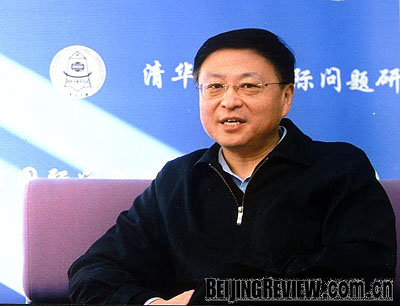|
|

"Meeting the Dalai Lama is the most direct way of using the Tibet issue to hedge against China." —Yan Xuetong, Director of the Institute of International Studies at Tsinghua University |
Days before the 11th China-EU Summit scheduled for early December in France, French President Nicolas Sarkozy, who currently holds the rotating presidency of the EU, said that he would meet with the Dalai Lama after the summit. In response, China announced it would postpone the China-EU Summit, a harsh stance that caused an international media frenzy. Why did China throw itself into this unusual rage? Is it because the French Government has infringed upon the bottom line of its national interests? Beijing Review reporter Yan Wei spoke to Yan Xuetong, Director of the Institute of International Studies at Tsinghua University, about these questions.
Beijing Review: The Chinese Government has decided to postpone the 11th China-EU Summit because of French President Nicolas Sarkozy's planned meeting with the Dalai Lama. What do you think the reasons are?
Yan Xuetong: The Tibet issue is an issue of sovereignty and territorial integrity for China and bears on the country's core interests. Since Ma Ying-jeou took office in Taiwan in May, relations across the Taiwan Straits have improved. The Taiwan question has been marginalized and is no longer an effective tool for Western countries to contain China. In this context, they have resorted to the Tibet issue, and meeting the Dalai Lama is the most direct way of using the Tibet issue to hedge against China. France is not alone. German leader Angela Merkel also met with the Dalai Lama before. I think more Western leaders may follow suit.
China's decision has had strong repercussions in Europe, why?
In fact, there are two different reactions in Europe. The EU's reaction is different from that of France. The EU has expressed "regret" over the postponement of the China-EU Summit. France, however, said its president's decision would not be changed. The EU's response represents all its member states. It is rather moderate because other European countries do not share the same position with France. There are a number of reasons for France's vehement reaction: First, French media's coverage of the riots in Tibet in March made a misconception of the French general public that the Dalai Lama pursues a just cause. In France, this perception is stronger than in other European countries. Second, China decided to postpone the China-EU Summit in retaliation against France, not the EU. China will not refuse to associate with EU leaders. In fact, Sarkozy's rotating EU presidency ends at the end of December.
Third, a common belief in French society is that despite its political support for China, France has not received any special treatment from China in terms of economic cooperation. During Sarkozy's visit to China in November last year, the two countries signed a number of business agreements amounting to 20 billion euros ($26 billion). But the French believe that many other European countries share the contracts with France. For example, France produces Airbus planes in collaboration with other European countries. In the eyes of the French people, these countries have cashed in on France's efforts. The French put greater value on bilateral trade between China and France. At present, bilateral trade volume between China and France is less than that between China and Germany. The French therefore feel bad, believing that China has not treated them fairly.
At a time when countries are joining hands to cope with the global financial crisis, what implications will China's decision have for China-EU relations and beyond?
Joint efforts to address the financial crisis should have been conducive to the development of China-France relations. However, the lack of cooperation at present has aggravated conflicts between the two countries. France does not believe that China has shown willingness to cooperate. At the financial summit in Washington in November, France put forward a reform scheme that calls for raising the euro's status in the international financial system. China did not give explicit support to this proposal. China and Japan do not want to see the dollar depreciate and lose its status as an international currency too quickly because that will inflict severe losses on them. That's exactly why China did not support France's proposal to make the euro an international currency on par with the dollar. It is also part of the reason why Sarkozy wants to meet with the Dalai Lama.
The financial crisis is expected to last about 18 months. During this period, both the Chinese and French economies will suffer difficulties. There will not be much room for them to make further compromises on their trade relations. As a result, economic frictions between the two countries will mount.
Although they may compromise on some issues, countries uphold their bottom lines in international relations. In your view, what is China's bottom line?
I am of the view that the principle that sovereignty should never be yielded should become the bottom line of China's diplomacy. | 